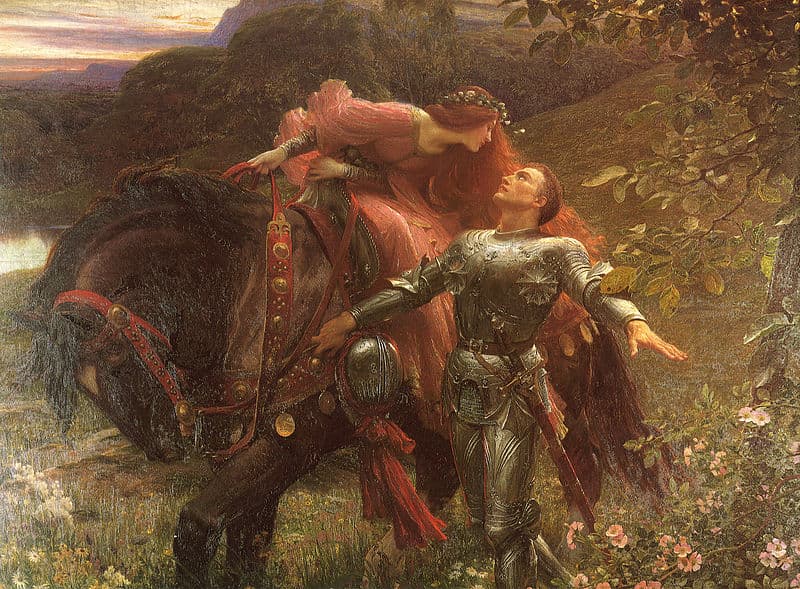Poem of the Day: ‘La Belle Dame Sans Merci’
Besides the mesmerizing ballad form, what makes this poem by John Keats so compelling are the things we don’t know.

With today’s poem, we commemorate the Halloween birthday of John Keats (1795–1821), the youngest and shortest-lived of the English Romantics. “La Belle Dame Sans Merci” recreates a medieval folk form, the ballad, whose quatrain we recognize by its alternation of tetrameter lines with trimeter, and its rhymes in the second and fourth lines. This was an ideal form for verse storytelling: a formal pattern of meter and rhyme that made its words both compelling to hear and easy to memorize, with enough freedom that the narrative could move the story forward.
Here we have a creepy story of the sort that medieval audiences loved — but so, nearly a century later, would William Butler Yeats. Yeats’s “The Stolen Child,” which appeared as Poem of the Day in June 2022, might have been spoken by this “Belle Dame Sans Merci,” a beautiful fairy enchanter enticing a human away from his own world and people to a shadowland of immortal captives, miserable in their unending half-life. In Keats’s poem, so appropriate to the gray waning of the autumn, the “knight-at-arms,” “loitering” alone in a barren landscape relates the tale of his enchantment to some interlocutor who — for some reason we don’t know — is also passing through this dreary region.
Besides the mesmerizing ballad form, what makes this poem so compelling are the things we don’t know. Who is this interlocutor who stops to question the knight? What is that person doing all alone by that birdless lake? And the knight himself: has he escaped from his charmed doom? Does he stand sentry, to warn other knights away? Or has the enchantress chained him there, fair as he is, to lure others in even as he cries the alarm, to entrap them forever in a wintry place where “no birds sing?” It’s that ghost-story uncertainty, full of eerie possibility, that gives this ballad its chilly post-Halloween shiver.
La Belle Dame Sans Merci
by John Keats
O what can ail thee, knight-at-arms,
Alone and palely loitering?
The sedge has withered from the lake,
And no birds sing.
O what can ail thee, knight-at-arms,
So haggard and so woe-begone?
The squirrel’s granary is full,
And the harvest’s done.
I see a lily on thy brow,
With anguish moist and fever-dew,
And on thy cheeks a fading rose
Fast withereth too.
I met a lady in the meads,
Full beautiful—a faery’s child,
Her hair was long, her foot was light,
And her eyes were wild.
I made a garland for her head,
And bracelets too, and fragrant zone;
She looked at me as she did love,
And made sweet moan
I set her on my pacing steed,
And nothing else saw all day long,
For sidelong would she bend, and sing
A faery’s song.
She found me roots of relish sweet,
And honey wild, and manna-dew,
And sure in language strange she said —
‘I love thee true’.
She took me to her Elfin grot,
And there she wept and sighed full sore,
And there I shut her wild wild eyes
With kisses four.
And there she lullèd me asleep,
And there I dreamed — Ah! woe betide! —
The latest dream I ever dreamt
On the cold hill side.
I saw pale kings and princes too,
Pale warriors, death-pale were they all;
They cried — ‘La Belle Dame sans Merci
Thee hath in thrall!’
I saw their starved lips in the gloam,
With horrid warning gapèd wide,
And I awoke and found me here,
On the cold hill’s side.
And this is why I sojourn here,
Alone and palely loitering,
Though the sedge is withered from the lake,
And no birds sing.
___________________________________________
With “Poem of the Day,” The New York Sun offers a daily portion of verse selected by Joseph Bottum with the help of the North Carolina poet Sally Thomas, the Sun’s associate poetry editor. Tied to the day, or the season, or just individual taste, the poems are drawn from the deep traditions of English verse: the great work of the past and the living poets who keep those traditions alive. The goal is always to show that poetry can still serve as a delight to the ear, an instruction to the mind, and a tonic for the soul.
